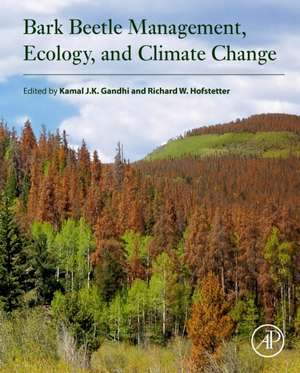Bark Beetle Management, Ecology, and Climate Change
Editat de Kamal J.K. Gandhi, Richard W. Hofstetteren Limba Engleză Hardback – 2 noi 2021
Written by international experts on bark beetle ecology, this book covers topics ranging from changes in bark beetle distributions and addition of novel hosts due to climate change, interactions of insects with altered host physiology and disturbance regimes, ecosystem-level impacts of bark beetle outbreaks due to climate change, multi-trophic changes mediated via climate change, and management of bark beetles in altered forests and climate conditions.
Bark Beetle Management, Ecology, and Climate Change is an important resource for entomologists, as well as forest health specialists, policy makers, and conservationists who are interested in multi-faceted impacts of climate change on forest insects at the organismal, population, and community-levels.
- The only book that addresses the impacts of global warming on bark beetles with feedback loops to forest patterns and processes
- Discusses altered disturbance regimes due to climate change with implications for bark beetles and associated organisms
- Led by a team of editors whose expertise includes entomology, pathology, ecology, forestry, modeling, and tree physiology
Preț: 784.55 lei
Preț vechi: 1005.44 lei
-22% Nou
Puncte Express: 1177
Preț estimativ în valută:
150.17€ • 163.17$ • 126.23£
150.17€ • 163.17$ • 126.23£
Carte tipărită la comandă
Livrare economică 14-28 aprilie
Preluare comenzi: 021 569.72.76
Specificații
ISBN-13: 9780128221457
ISBN-10: 0128221453
Pagini: 438
Ilustrații: Approx. 170 illustrations (170 in full color)
Dimensiuni: 191 x 235 mm
Editura: ELSEVIER SCIENCE
ISBN-10: 0128221453
Pagini: 438
Ilustrații: Approx. 170 illustrations (170 in full color)
Dimensiuni: 191 x 235 mm
Editura: ELSEVIER SCIENCE
Cuprins
Part I: Insect distributions and novel hosts
1. Climate change and invasion by non-native bark and ambrosia beetles
2. Complexities in predicting mountain pine beetle and spruce beetle response to climate change
3. Responses and modeling of southern pine beetle and its host pines to climate change
Part II: Interactions of insects with altered host physiology
4. The Eurasian spruce bark beetle in a warming climate: phenology, behaviour and biotic interactions
5. Southwestern examples
6. Relationships between drought, coniferous tree physiology, and Ips bark beetles under climatic changes
Part III: Interactions of insects with altered disturbance regimes
7. Interactions between catastrophic wind disturbances and bark beetles in forested ecosystems
Part IV: Ecosystem-level impacts of bark beetle outbreaks due to climate change
8. Bark beetle outbreaks alter biotic components of forested ecosystems
9. Eastern larch beetle, a changing climate, and impacts to northern tamarack forests
Part V: Multi-trophic changes mediated via climate change
10. Effects of rising temperatures on ectosymbiotic communities associated with bark and ambrosia beetles
Part VI: Management of bark beetles in altered forests and climate conditions
11. Management strategies to reduce bark beetle impacts in North America and Europe under altered forest and climatic conditions
12. Conclusions: interactions among climate, disturbance and bark beetles affect the forest landscapes of the future
1. Climate change and invasion by non-native bark and ambrosia beetles
2. Complexities in predicting mountain pine beetle and spruce beetle response to climate change
3. Responses and modeling of southern pine beetle and its host pines to climate change
Part II: Interactions of insects with altered host physiology
4. The Eurasian spruce bark beetle in a warming climate: phenology, behaviour and biotic interactions
5. Southwestern examples
6. Relationships between drought, coniferous tree physiology, and Ips bark beetles under climatic changes
Part III: Interactions of insects with altered disturbance regimes
7. Interactions between catastrophic wind disturbances and bark beetles in forested ecosystems
Part IV: Ecosystem-level impacts of bark beetle outbreaks due to climate change
8. Bark beetle outbreaks alter biotic components of forested ecosystems
9. Eastern larch beetle, a changing climate, and impacts to northern tamarack forests
Part V: Multi-trophic changes mediated via climate change
10. Effects of rising temperatures on ectosymbiotic communities associated with bark and ambrosia beetles
Part VI: Management of bark beetles in altered forests and climate conditions
11. Management strategies to reduce bark beetle impacts in North America and Europe under altered forest and climatic conditions
12. Conclusions: interactions among climate, disturbance and bark beetles affect the forest landscapes of the future
Recenzii
"….This book will have broad appeal both as an essential resource for amateur and professional herpetologists as well as an informative guide for anyone interested in the background and biology of exotic amphibians and reptiles. Cumulatively, the species accounts offer up-to-date coverage that will be useful to land managers, state and federal agencies, conservation groups, and research ecologists interested in seeking further data on the ecological effects of exotic species on local habitats." --The Quarterly Review of Biology
